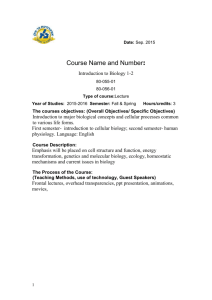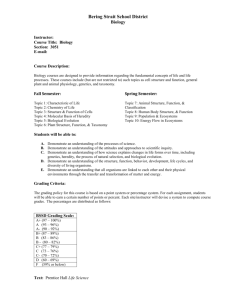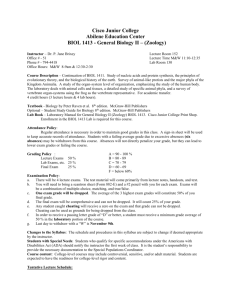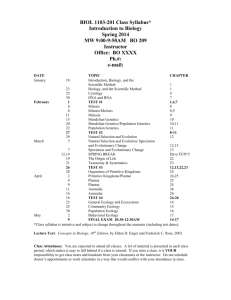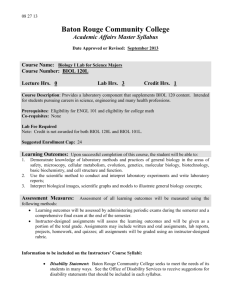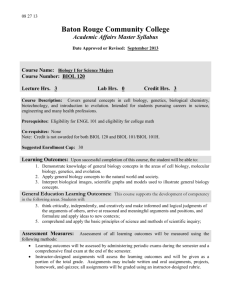BIO 161 elzanati - Heartland Community College
advertisement
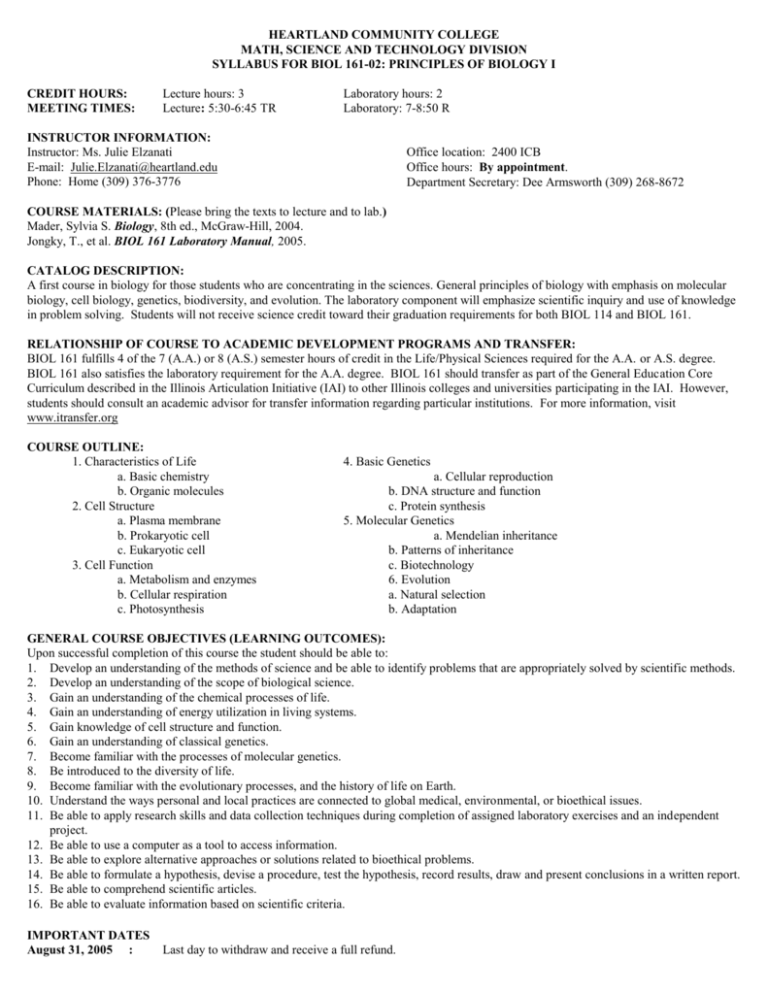
HEARTLAND COMMUNITY COLLEGE MATH, SCIENCE AND TECHNOLOGY DIVISION SYLLABUS FOR BIOL 161-02: PRINCIPLES OF BIOLOGY I CREDIT HOURS: MEETING TIMES: Lecture hours: 3 Lecture: 5:30-6:45 TR Laboratory hours: 2 Laboratory: 7-8:50 R INSTRUCTOR INFORMATION: Instructor: Ms. Julie Elzanati E-mail: Julie.Elzanati@heartland.edu Phone: Home (309) 376-3776 Office location: 2400 ICB Office hours: By appointment. Department Secretary: Dee Armsworth (309) 268-8672 COURSE MATERIALS: (Please bring the texts to lecture and to lab.) Mader, Sylvia S. Biology, 8th ed., McGraw-Hill, 2004. Jongky, T., et al. BIOL 161 Laboratory Manual, 2005. CATALOG DESCRIPTION: A first course in biology for those students who are concentrating in the sciences. General principles of biology with emphasis on molecular biology, cell biology, genetics, biodiversity, and evolution. The laboratory component will emphasize scientific inquiry and use of knowledge in problem solving. Students will not receive science credit toward their graduation requirements for both BIOL 114 and BIOL 161. RELATIONSHIP OF COURSE TO ACADEMIC DEVELOPMENT PROGRAMS AND TRANSFER: BIOL 161 fulfills 4 of the 7 (A.A.) or 8 (A.S.) semester hours of credit in the Life/Physical Sciences required for the A.A. or A.S. degree. BIOL 161 also satisfies the laboratory requirement for the A.A. degree. BIOL 161 should transfer as part of the General Education Core Curriculum described in the Illinois Articulation Initiative (IAI) to other Illinois colleges and universities participating in the IAI. However, students should consult an academic advisor for transfer information regarding particular institutions. For more information, visit www.itransfer.org COURSE OUTLINE: 1. Characteristics of Life a. Basic chemistry b. Organic molecules 2. Cell Structure a. Plasma membrane b. Prokaryotic cell c. Eukaryotic cell 3. Cell Function a. Metabolism and enzymes b. Cellular respiration c. Photosynthesis 4. Basic Genetics a. Cellular reproduction b. DNA structure and function c. Protein synthesis 5. Molecular Genetics a. Mendelian inheritance b. Patterns of inheritance c. Biotechnology 6. Evolution a. Natural selection b. Adaptation GENERAL COURSE OBJECTIVES (LEARNING OUTCOMES): Upon successful completion of this course the student should be able to: 1. Develop an understanding of the methods of science and be able to identify problems that are appropriately solved by scientific methods. 2. Develop an understanding of the scope of biological science. 3. Gain an understanding of the chemical processes of life. 4. Gain an understanding of energy utilization in living systems. 5. Gain knowledge of cell structure and function. 6. Gain an understanding of classical genetics. 7. Become familiar with the processes of molecular genetics. 8. Be introduced to the diversity of life. 9. Become familiar with the evolutionary processes, and the history of life on Earth. 10. Understand the ways personal and local practices are connected to global medical, environmental, or bioethical issues. 11. Be able to apply research skills and data collection techniques during completion of assigned laboratory exercises and an independent project. 12. Be able to use a computer as a tool to access information. 13. Be able to explore alternative approaches or solutions related to bioethical problems. 14. Be able to formulate a hypothesis, devise a procedure, test the hypothesis, record results, draw and present conclusions in a written report. 15. Be able to comprehend scientific articles. 16. Be able to evaluate information based on scientific criteria. IMPORTANT DATES August 31, 2005 : Last day to withdraw and receive a full refund. November 9, 2005 : Last day to withdraw and receive a W grade. METHOD OF STUDENT EVALUATION: Lecture (590 points total) Exams 4 @ 100 Comprehensive Final 1 @ 100 Reading Reports 3 @ 10 Exercises 8 @ 20 Drop lowest exam 1 @ 100 400 100 30 160 690 -100 590 Lab (280 points total) Lab Reports 14 @ 20 280 Lecture grades will be on a points-percentage basis using the scores from four lecture exams, a comprehensive final, three article summaries, and eight exercises. Exams will be worth 100 points each and will be multiple-choice, matching and short answer questions. You can drop your lowest exam score. If you are absent from one of the exams without permission, it will be counted as your lowest score. The lab portion of the grade will be based on lab reports. Total possible course points = 870 points. The grading scale will be as follows: Grade: A B C D F Percent Points: 90 - 100 797 - 890 80 - 89 708 – 796 70 - 79 619 - 707 60 - 69 530 - 618 0 - 59 < 530 POLICIES ON ASSIGNMENTS/TESTS/MAKEUPS: Students are expected to take exams on the scheduled dates. Since one exam is dropped in calculating the final grade, no make-up exams will be given. In the case that there is an excused absence which the instructor has been notified of, arrangements can be made to take the exam before the next class meeting. There are no make-up opportunities for lab sessions. All assignments are due on the assigned dates. 20% of the assignment's point value will be deducted for each weekday that it is late. POLICIES ON PARTICIPATION AND ATTENDANCE Students must take responsibility for their own learning by attending and actively participating in all lecture and lab sessions. Regular attendance is expected and necessary for academic success. In science, each lecture will build on the information learned in the previous lecture. Students are responsible for any missed class material. Students are expected to read the assigned information in the textbook, take notes during lecture, and ask pertinent questions about concepts. If the student is having difficulty with a particular topic, it is his or her responsibility to ask questions or consult with the teacher to gain additional help. Students can enhance the learning environment by showing courtesy and respect for fellow students as well as the instructor. It is the student's responsibility to withdraw from the course by November 9, 2005 if a W is desired. Incompletes An incomplete will only be given for a student that has completed the majority of the course and has an acceptable reason as determined by the instructor. A written agreement and schedule should accompany the request for an incomplete. FOLLOWING THESE STEPS WILL ASSIST THE STUDENT IN ACHIEVING COURSE SUCCESS: 1. Attend lecture and labs regularly. 2. Bring textbook and other materials to lecture and lab. 3. Take thorough notes both in lecture and in lab. 4. Complete lab assignments, using the required format, and submit them on time. 5. Complete the reading assignments on time. 6. Review notes and text for lecture and lab exams. 7. Write down questions to ask before the exam. 8. Take the lecture and lab exams as scheduled. 9. Review corrected tests after they are returned using the opportunity to completely master the material. BELIEFS ABOUT THE STUDY OF BIOLOGY: This course is an introduction to the field of biology, "the science of life". The study of biology includes cellular and biochemical processes as well as the study of organism processes, biodiversity, populations and interactions between living things and the environment. While humans may be used as a representative species in studying animal systems, such study should not exclude an overview of the diversity of life on Earth and the importance of other organisms in maintaining a viable biosphere. BELIEF ABOUT THE INSTRUCTOR'S ROLE: The teacher is responsible for facilitating student's learning by conducting lectures and discussions in an organized manner, preparing labs that enhance learning, clearly stating course objectives, and evaluating student progress based on course objectives. While some class time should be taken to answer questions and clarify lecture material, the teacher must move on to other topics in a timely fashion to be fair to students who are ready to advance. The teacher must be available outside of the classroom to aid students who need additional help. ACADEMIC INTEGRITY Students should take pride in their own work and must not violate the principles of dishonesty as set out in the HCC Catalog (pp. 32-34) and the HCC Student Handbook (pp. 44, 50-1). In this course, violations of the policy will automatically result in a "0" on the assignment. PLAGIARISM Plagiarism is the presenting of others’ ideas as if they were your own. When you write a paper, create a project, do a presentation, or create anything original, it is assumed that all the work, except for that which is attributed to another author or creator, is your own. If you include word-for-word copying, paraphrases or even ideas of another person in your papers, then you must include an acknowledgment. If you work on a project with a friend, you should write the answers in your own words (do not write the same group answer). Plagiarism is a serious academic offense! Real or pretended ignorance of what constitutes plagiarism will not excuse students from the penalties of such conduct. [Adapted from the Modern Language Association’s MLA Handbook for Writers of Research Papers. New York: MLA, 1995:26] HEARTLAND LIBRARY INFORMATION www.hcc.cc.il.us/library (309) 268-8200 TUTORING AND ACADEMIC SUPPORT: Various forms of learning assistance are available at no cost to Heartland students at the Academic Support Center (ASC) in Normal and at the Pontiac and Lincoln Centers. To request information about tutors and facilitated study groups, call (309) 268-8235 (Normal); (815) 8426777 (Pontiac); (217) 735-1731 (Lincoln), or visit www.hcc.cc.il.us/asc/tutor.html. For information about the Testing Center, where you can take pre-arranged make-up tests, visit www.hcc.cc.il.us/asc/testing.html. For computer lab information, visit www.hcc.cc.il.us/asc/computerlab.html. SYLLABI DISCLAIMER: This syllabus is subject to change. You are responsible for attending lectures or, if absent, inquiring to see if any written or verbal changes have been made. EXAM 1 EXAM 2 EXAM 3 EXAM 4 COMPREHENSIVE FINAL Exercise 1 Exercise 2 Exercise 3 Exercise 4 Exercise 5 Exercise 5 Exercise 6 Exercise 7 Exercise 8 Reading Report #1 Reading Report #2 Reading Report #3 Lab 1: Lab 2: Lab 3: Lab 4: Lab 5: Lab 6: Lab 7: Lab 8: Lab 9: Lab 10: Lab 11: Lab 12: Lab 13: Lab 14: Possible Points 100 100 100 100 100 20 20 20 20 20 20 20 20 20 10 10 10 20 20 20 20 20 20 20 20 20 20 20 20 20 20 Your Points Dropped exam TOTAL COURSE POINTS (100) 870 DAY 8/18 (R) 8/23 (T) 8/25 (R) 8/30 (T) 9/1 (R) 9/6 (T) 9/8 (R) 9/13 (T) 9/15 (R) 9/20 (T) 9/22 (R) 9/27 (T) 9/29 (R) 10/4 (T) 10/6 (R) 10/11 (T) 10/13 (R) 10/18 (T) 10/20 (R) 10/25 (T) 10/27 (R) 11/1 (T) 11/3 (R) 11/8 (T) 11/10 (R) 11/15 (T) 11/17 (R) 11/22 (T) 11/24 (R) 11/29 (T) 12/1 (R) 12/6 (T) 12/8 (R) 12/13 (T) TOPICS Welcome; microscopes Scientific method Characteristics of life Classification Basic chemistry Organic macromolecules EXAM 1 Cell size; prokaryotic cells Eukaryotic cells Plasma membrane Diffusion; osmosis Metabolism; energy; ATP Enzymes EXAM 2 Cellular respiration Photosynthesis Cell cycle Mitosis Meiosis DNA structure; DNA replication EXAM 3 Protein synthesis Protein synthesis Mendelian genetics Beyond Mendelian genetics Chromosomal patterns of inheritance Genetic disorders EXAM 4 NO CLASSES - THANKSGIVING Biotechnology Genomics Natural selection Evolution COMPREHENSIVE FINAL BIOLOGY 161 FALL 2005 COURSE AND LAB SCHEDULE TEXT EXERCISES SUMMARIES Ch. 1 Ex. 1 Ex. 2 LAB Metric System & Microscopy: Lab #1 What is Life: Lab #2 Ch. 20 Ch. 2 Ch. 3 Ex. 3 Ch. 4 Exercises Due Ex. 4 Ex. 5 Chemistry of Life: Lab #4 Report #1 Due Lurking Microbes: Lab #3 Ch. 5 Homeostasis: Lab # 5 Ch. 6 Cellular Pathology: Lab #6 Ch. 8 Ch. 7 Exercises Due Ex. 6 Pump up the Volume: Lab #7 Report #2 Due Photosynthesis: Lab #8 Ch. 9 Ch. 10 Ch. 13 Mitosis/Meiosis: Lab #9 Ch.14 Exercises Due Ex. 7 Ch. 11 Ex.8 Blueprint of Life: Lab #10 Report #3 Due Mendelian Genetics: Lab #11 Ch. 12 Human Genetic Disorders: Lab #12 Exercises Due Ch. 16 DNA Detective: Lab #13 Ch. 17 Ch. 18 Natural Selection: Lab #14


